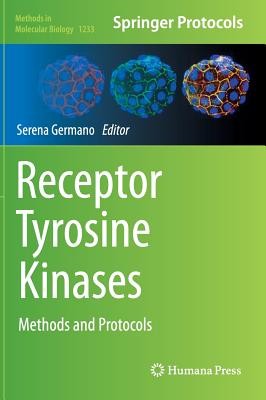
- We will send in 10–14 business days.
- Publisher: Humana
- Year: 2014
- Pages: 181
- ISBN-10: 1493917889
- ISBN-13: 9781493917884
- Format: 17.8 x 25.4 x 1.3 cm, hardcover
- Language: English
- SAVE -10% with code: EXTRA
Receptor Tyrosine Kinases (e-book) (used book) | bookbook.eu
Reviews
Description
Receptor Tyrosine Kinases: Methods and Protocols explores on the most widely studied of the protein classes, known for their central role in several cellular functions and in a variety of human pathologies. Beginning with a section on activation and signaling of Receptor Tyrosine Kinases (RTKs), the book continues with chapters on aberrant expression of RTKs, trafficking and negative regulation, as well as RTKs as pharmacological targets. Written in the highly successful Methods in Molecular Biology series format, chapters include introductions to their respective topics, lists of the necessary materials and reagents, step-by-step, laboratory protocols, and tips on troubleshooting and avoiding known pitfalls.
Authoritative and practical, Receptor Tyrosine Kinases: Methods and Protocols contains an up-to-date overview of the most relevant and widely used methods employed in this field, providing detailed protocols that molecular and cellular biologists could easily adopt in their research programs on RTKs.
EXTRA 10 % discount with code: EXTRA
The promotion ends in 16d.18:58:21
The discount code is valid when purchasing from 10 €. Discounts do not stack.
- Publisher: Humana
- Year: 2014
- Pages: 181
- ISBN-10: 1493917889
- ISBN-13: 9781493917884
- Format: 17.8 x 25.4 x 1.3 cm, hardcover
- Language: English English
Receptor Tyrosine Kinases: Methods and Protocols explores on the most widely studied of the protein classes, known for their central role in several cellular functions and in a variety of human pathologies. Beginning with a section on activation and signaling of Receptor Tyrosine Kinases (RTKs), the book continues with chapters on aberrant expression of RTKs, trafficking and negative regulation, as well as RTKs as pharmacological targets. Written in the highly successful Methods in Molecular Biology series format, chapters include introductions to their respective topics, lists of the necessary materials and reagents, step-by-step, laboratory protocols, and tips on troubleshooting and avoiding known pitfalls.
Authoritative and practical, Receptor Tyrosine Kinases: Methods and Protocols contains an up-to-date overview of the most relevant and widely used methods employed in this field, providing detailed protocols that molecular and cellular biologists could easily adopt in their research programs on RTKs.


Reviews